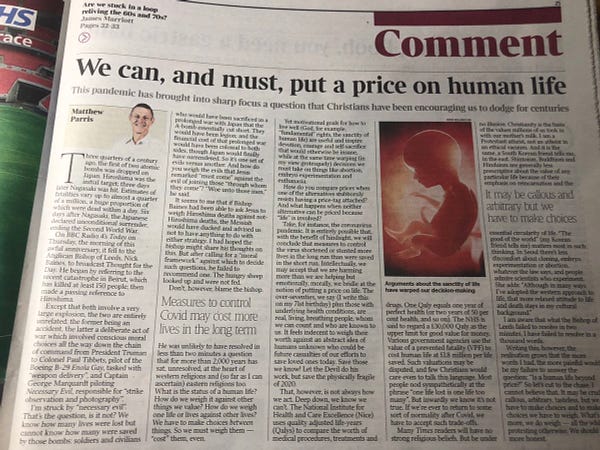Eugenics if you want to: Columnists think they can question anyone's right to live
Or... f*ck Matthew Parris.

Sometimes I read a column in a British newspaper and think, ‘Boy, that is some straight-up Nazi shit.” Usually, it comes with the byline Rod Liddle, but yesterday Matthew Parris served up a gateau of such gelatinous horror that Joseph Goebbels would have gone back for seconds.
It ran under the headline: WE CAN AND MUST, PUT A PRICE ON HUMAN LIFE. Even that seems to ignore how successive governments have put disabled people through demeaning tests to make them beg for their benefits. But much much worse was to come. Parris began with a Moral Maze-style chin-stroking disquisition on the atom bomb and the decision to drop two on Japan — first destroying Hiroshima, then repeating the atrocity in Nagasaki.
His ire is directed at the Bishop of Leeds, Nick Baines, who used his Thought for the Day slot on the Today programme to draw parallels between the explosion in Beirut and the Bomb, in what Parris admitted was “a passing reference to Hiroshima”. This was, however, enough to have Parris spitting feathers:
“… the two are entirely unrelated: the former being an accident, the latter a deliberate act of war which involved conscious moral choices all the way down the chain of command from President Truman to Colonel Paul Tibbets pilot of the Boeing B-29 Enola Gay…”
Well, this is horse shit. By the time Parris filed his column, it was already becoming clear that the Beirut explosion was more than an accident and that it was, in fact, the product of corruption and carelessness that was driven by the political vacuum and inherent dysfunction at the heart of Beirut, a place that has been treated by the cheapest football by bigger countries.
Parris then trundles into the question of ‘necessary evil’ making the usual statements about how Hiroshima had to be destroyed to save many soldiers and civilians. He is, of course, in those assertions putting a price on Allied lives versus the lives of those Japanese civilians who were both killed and permanently disabled by the bomb. But, being the Tory he is, he also notes “the financial cost of that prolonged war would have been colossal on both sides.” So there you go: The Atom Bomb was a money-saver.
The column — already bat shit — goes all out chewing tin foil and declaring yourself to be a divine being sent to rid the earth of chocolate biscuits when Parris decides to state fairly definitively what Jesus would think of the Bishop of Leeds:
“It seems to me that if Bishop Baines had been able to ask Jesus to weight Hiroshima deaths against non-Hiroshima deaths, the Messiah would have ducked and advised us not to have anything to do with either strategy. I had hoped the bishop might share his thoughts on this. But after calling for a ‘moral framework’ against which to decide such questions, he failed to recommend one.”
Perhaps, just perhaps, the Bishop of Leeds doesn’t have the level of arrogance required to believe he has a certain moral answer? And if he did, he’d probably have a column in The Times.
Of course, Parris finally gets to his point and the thrust of his column is actually just one of The Times’ hobby horses — the economic cost of the pandemic and how we should just let the weakest members of society die in order to preserve the profits. He makes this point by more burbling about Christianity and a swerve into some very racist implications about ‘the east’:
“… a South Korean friend tells me, in the east, Shintoism, Buddhism, and Hinduism are generally less prescriptive about the value of any particular life because of their emphasis on reincarnation and the essential circularity of life.”
It’s all a bit ‘do the Russians love their children too?’ and I am not the only one who raised their eyebrows so high that it looked like I was attempting to cosplay as Leonid Breshnev. Parris conclusion just left me vibrating with rage:
“Writing this… the realisation grows that the more words I had, the more painful would be my failure to answer the question: ‘Is a human life beyond price?’ So let’s cut to the chase, I cannot believe that. It may be crude, callous, arbitrary, tasteless, but we have to make choices and to make choices we have to weigh. What’s more, we do weigh — all the while protesting otherwise. We should be more honest.”
‘We’ is a powerful word for a columnist. It allows them to pretend that their personal worldview is a collectively shared thing, that the views of their political cabal are just the ‘common sense’ of the proletariat — whether or not they’ve met someone with a real job in the past 20 years of not, beyond vaguely gesturing in their direction for more wine or telling them that the boiler has broken.
The British media, whether in the atrocity exhibition of the Moral Maze or the ‘rationalist’ abuses of The Times comment section, is like an undergraduate debating competition where huge issues that really matter are treating as interesting abstracts rather than part of people’s real lives, particularly poor and disabled people’s real lives. For columnists and politicians who treat politics as a game, it makes life easier if disabled people, poor people, travellers, immigrants, refugees, Roma people etc. etc. are treated like non-player characters in a Call of Duty — sometimes entertaining but utterly disposable, their lives and deaths meaningless.


One of the rallying cries of second-wave feminism — the personal is political — guides me often when I’m writing these newsletters. In the case of Parris’ column, I immediately thought of my dear departed friend Lucy Glennon. Lucy died aged 29, having lived her entire life with a condition called Epidermolysis bullosa (EB), which results in easy blistering of the skin and mucous membranes.
The practical reality is that people living with EB need significant and constant personal care and live shortened lives. For Lucy, the pain was, in her own words, “a constant thing like static in the background on a badly-tuned radio.” And yet, my incredible friend managed to make a career as a journalist, though massively restricted because doing too much work would have affected her benefits and put her life at risk.
In the end, Lucy spent the last few years of her life in constant worry that her benefits might be recalculated, depriving her of the freedom she had to live independently in London. I firmly believe that the Coalition and Conservative governments insistence on putting people like Lucy through frequent tests of their capability — despite the fact that Lucy’s condition was only ever going to decline — further shortened her limited time on this planet.
That is why I despise what Matthew Parris wrote. Lucy wanted to be valuable and valued as we all do. She studied journalism and she wanted to be a journalist all the time. But the government made it so if she pursued that career as best she could, they would deprive her of things she desperately needed. So Lucy could never be ‘economically valuable’ because the system refused to allow it.
Let me abundantly clear though: Lucy was loved and valued, and she is deeply missed by her family and her friends. As I write this I am struggling not to tear up — something she would have called me ‘soft’ for doing, Rotherham girl that she was — and I don’t go a day without thinking of my friend. She was one of the most excellent humans I have ever met. If we are going to do the sick accounting that Parris demands that we should, the value of having Lucy Glennon in my life was incalculable. It is a debt that I could never repay.


There’s a tweet going around at the moment that asks: “What radicalised you?” I gave some half-joking answers, but, like yesterday’s edition on reporting suicides, Lucy’s death was a contributing factor to radicalising me. I became far, far more politically active because I saw the direct consequences of the callousness. I do not want to live in a society that doesn’t value everyone. I valued Lucy. The state did not.



